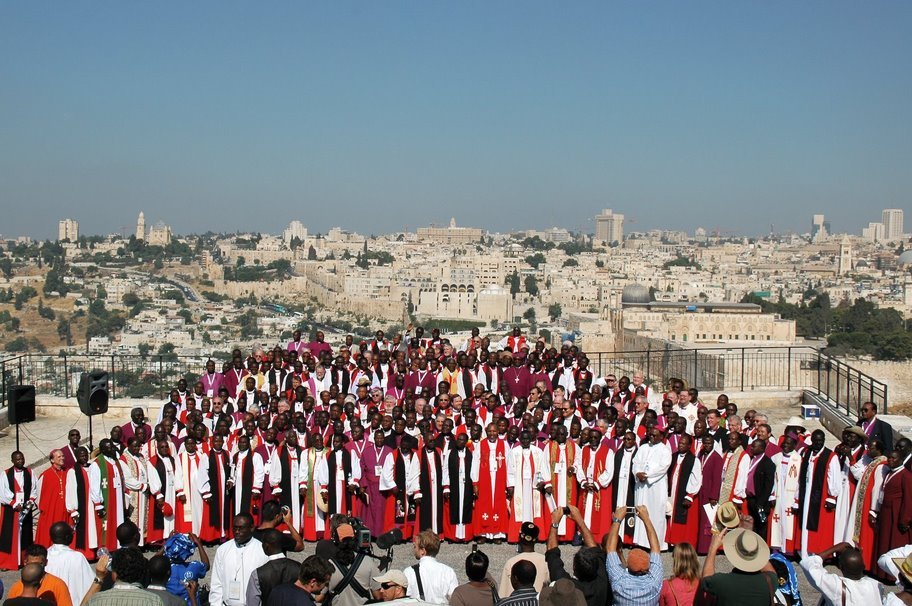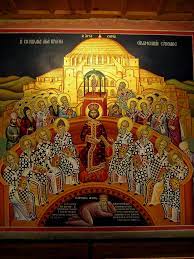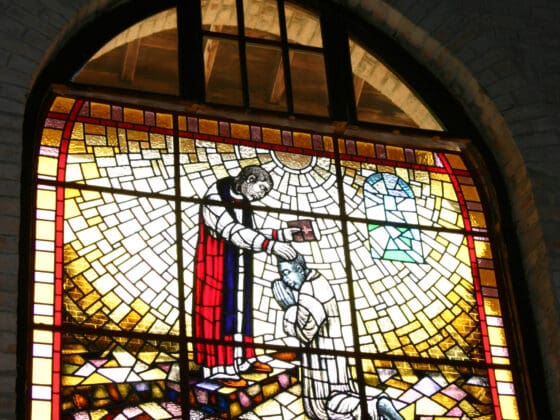by the Rev. Dr. Stephen Noll
For an onlne Commentary on the Fourteen Theses, see here. For a downloadable PDF, see here.
I was glad when they said to me, “Let us go to the house of the LORD!” Our feet have been standing within your gates, O Jerusalem! Jerusalem, built as a city that is bound firmly together, to which the tribes go up, the tribes of the LORD, as was decreed for Israel, to give thanks to the name of the LORD.
(Psalm 122:1-4)
Prefatory Note
I originally addressed the “Fourteen Theses” to the Gafcon Primates as they prepared for the upcoming Global Anglican Future Conference (GAFCON IV) in Kigali, Rwanda on 17-21 April, 2023. As I expounded on the original theses, I amended them somewhat to include a parallel and overlapping group of Global Anglicans represented by the Global South Fellowship (formally the Global South Fellowship of Anglican Churches or GFSA). I have been involved with both these groups over the years and believe they have a joint destiny in reviving, reforming and reordering the Anglican Communion. SN
The Crisis of Contemporary Anglicanism
Thesis 1: This Present Darkness
The world of the 21st century is dominated by principalities and powers opposed to God and the biblical faith. In much of the non-Western world, enmity and persecution have come from militant religions and totalitarian regimes. In the West, postmodern ideologues have sought to overturn the biblical worldview of God as the Creator and Lord of life and death and of sexuality and marriage. In this quest, they have enjoyed apparent success (but cf. Psalm 2). Many Anglican churches and their leaders in North America and the UK have succumbed to this false ideology and are promoting its godless agenda.
Thesis 2: Autonomy and Authority
While the Anglican Communion inherited much of its theological DNA from the classic Reformation formularies, its governing structure was determined by the colonial requirements of the Established Church of England, where ultimate authority is vested in the state. Hence from its inception, the Communion came to be defined as a loose association of autonomous “provinces,” with the Lambeth “Conference” of bishops having no real authority over member churches in matters of doctrine and discipline.
Thesis 3: The Failure of Communion Governance
Over the past century, the Anglican Communion has grown exponentially in numbers in the Global South while declining in the West. Although the “Instruments of Unity” appear on paper to give representation to the newer churches, in practice the Communion bureaucracy in England – the Archbishop of Canterbury, the Communion Office, and financial backers in New York and London – run the show.
Thesis 4: Lambeth 1998
The 1998 Lambeth Conference provided the first real test of the capability of Communion structures to deal with heretical teaching and practice. In Resolution I.10 on Human Sexuality, an overwhelming majority of bishops stated that homosexual practices were contrary to Scripture and “could not be advised.” After twenty-five years of controversy and many Communion meetings, Western churches continue to spurn this Resolution and have now formalized ordination and marriage of self-styled LGBT persons. These churches and bishops remain prominent members in the Communion in good standing.
Thesis 5: The Failure of Church Discipline
The Communion bureaucracy has been complicit in this failure of discipline. In fact, these same practices are being condoned in the Church of England, where the Government has legalized same-sex marriage and enforced LGBT rights and promoted them across the Communion. Within a few years, the CofE will formalize these practices, and the Communion bureaucracy will insist that other Anglicans accept these practices in terms of “good disagreement,” along the lines of the “Living in Love and Faith” exercise.
The Gafcon Response
Thesis 6: The Road to GAFCON
The convening of the Global Anglican Future Conference (GAFCON) in Jerusalem in 2008 was the most significant event in recent Anglican history. The bold leadership of Archbishop Peter Akinola and seven other Global South Primates upset the assumed dominance by the Communion establishment and set a precedent for the future of the Communion.
Thesis 7: The Global Fellowship of Confessing Anglicans
The 2008 Jerusalem Statement on the Global Anglican Future provides an authoritative basis for a new Communion of orthodox Anglicans. The Statement contains three elements: a prophetic indictment of the existing Communion, a confession of Anglican faith (the Jerusalem Declaration), and a new governing structure (a Primates Council).
Thesis 8: The Prophetic Indictment
The Jerusalem Statement from GAFCON 2008 opens with a prophetic indictment which identifies the ideology of the Western churches as “a different ‘gospel’ (cf. Galatians 1:6-8) which is contrary to the apostolic gospel.” Such rank heresy, it continues, has obliged orthodox churches to break communion with these churches. Finally, it faults the Communion “Instruments” for failing to take action and discipline those churches ten years after Lambeth 1998.
Thesis 9: The Declaration of Faith
The Statement includes the Jerusalem Declaration, which has been widely hailed as an excellent confession of Anglican faith and has been used as the basis for subsequent Conferences. Its first seven clauses recall historic Anglican essentials: the Gospel and Lordship of Christ, the inspiration and authority of the Bible, and in accordance with Scripture, the Creeds, the Articles, the Prayer Book, and the Ordinal. The second seven clauses address contemporary issues: sexuality and marriage; the Great Commission mandate; stewardship and social justice; and unity in diversity of the flock, while rejecting false shepherds.
Thesis 10: The Primates Council
The Jerusalem Conference established a Primates Council independent of the Lambeth “Instruments” and authorized it to recognize new confessing Anglican jurisdictions. Subsequently, the Gafcon Primates Council has recognized the Anglican Church in North America, the Anglican Church in Brazil, and a number of “Branches” inside existing unfaithful Anglican provinces.
The Next Step: Formation of a New Communion of Anglican Churches
Thesis 11: Gafcon and the Global South Fellowship: Parallel Lanes Toward a New Communion
In its “Letter to the Churches” from Jerusalem in 2018, the Gafcon Assembly urged the Archbishop of Canterbury to invite bishops from the Gafcon churches in North America and Brazil and to disinvite those bishops who had rejected and violated the teaching of Lambeth Resolution I.10, with a warning that otherwise Gafcon bishops would once again not attend the next Lambeth Conference. Meanwhile, the Global South Fellowship developed a “covenantal structure” for an emerging communion of churches.
Thesis 12: After Lambeth 2022
Archbishop Welby dismissed Gafcon as a mere pressure group, ignored its plea, and has sought to divide and conquer its members. Three Provinces and their Primates (Nigeria, Uganda, and Rwanda), representing over 30 million Anglicans, chose not to attend the Lambeth Conference in 2020 and explained their determination not to associate with heretics. Another group of Primates and bishops, representing nearly 10 million Anglicans of the Global South Fellowship, attended Lambeth, appealed to the Conference to uphold Lambeth I.10 and refused Communion with those who violated it. As ever, Canterbury and the Conference ignored their appeal.
Thesis 13: A New Communion of Churches
Plans should be laid at the 2023 Gafcon Assembly in Kigali – in conjunction with the Global South Fellowship – authorizing a working group to develop and present a final proposal for a revived, reformed, and reordered Communion to a joint Assembly in Jerusalem in 2028. This proposed new Communion – the “Jerusalem Communion of Global Anglicans” or the “Global Anglican Communion” – will fulfil Gafcon’s original vision to be an instrument of revival of historic Anglican faith and mission based on the confession of the Jerusalem Declaration. The final proposal will develop further covenantal structures of governance and mutual accountability appropriate to a communion of churches.
Thesis 14: What Is God Saying to Global Anglicans?
“Behold, I am doing a new thing; now it springs forth, do you not perceive it?” (Isaiah 43:19). The first Global Anglican Future Conference proclaimed that it was “not just a moment in time but a movement in the Spirit.” Fifteen years later, Global Anglicans are being called to assume leadership of a revived, reformed, and reordered Anglican Communion worldwide.
Stephen Noll is Professor Emeritus at Trinity School for Ministry, former Vice Chancellor of Uganda Christian University, and author of two books and numerous articles on global Anglicanism.





